The pervasive influence and conceptual complexity of gender as a scientific construct has lead to attempts to explain it from multiple perspectives. When each of these perspectives is offered, it tends to be presented as a complete explanation. Each perspective, however, likely offers only a partial truth concerning the enactment of gender. The recognition of the partiality of these perspectives indicates that each should be considered in some form when trying to address the full complexity of gender. It also makes clear that none should be privileged above any other. Through the application of the Integral model and Integral Methodological Pluralism (IMP), this article develops a broader and deeper conceptual and operational model for the study of gender than those that have been typically applied.
Introduction
Even before we take our first breath we are proscribed a “gender.” In childhood, we are taught, based on our biologically determined sex, what appropriate and inappropriate behavior is. As adolescents, we are pressured by peers and other social groups to conform to societal gender- oriented roles, which are often highly inflexible. Finally, in adulthood, we are proscribed even more specific gender-roles. These gender-roles are again based, if not solely, on biological sex. However, as will be discussed throughout this article, gender-roles are heavily influenced not only by biology, but by psychology and culture as well.
Gender not only influences our individual experiences but our collective experiences as well. For example, in foraging societies, gender has relatively little impact on social interaction outside of biological sex. As more advanced agrarian societies develop and the recognition of gender (primarily in the form of biological sex) increases, it begins to interact to a greater degree with the dominant modes of production. With the introduction of even more technological advancements (e.g., the industrial revolution), however, the influence of biological sex on culturally defined gender-stereotypes, our individually defined gender-identities, and socially proscribed gender-roles begins to decrease. As new modes of production are developed, societies are freed from their reliance on biologically driven gender-roles, and males and females experience decreased gender-role rigidity. As discussed in more detail below, this same general path towards decreased rigidity can be found when looking at gender-stereotypes and gender- identity as well. Even biological sex, something that is often viewed as a dichotomy, shows signs of decreased polarization as individuals develop across the life-span.

Become a member today to access this Journal article and support the global emergence of Integral consciousness
Membership benefits include:
Premium Content
Receive full access to weekly conversations hosted by leading thinkers

Journal Library
Receive full access to the growing Journal of Integral Theory & Practice library

Live Experiences
Stay connected by participating in Integral Life live events and discussions
Courses & Products
Get unlimited 20% discount off all products and courses from our friends and partners

Free Bonus Gifts
Download The Integral Vision eBook by Ken Wilber (worth $19 on Amazon) & The Ken Wilber Biography Series

Support of the movement
Support our mission of educating and spreading integral consciousness that is more critical than at any time in its history
About Jeff Cohen
JEFF COHEN is a Doctoral Candidate in the Department of Criminology at Indiana University of Pennsylvania. Jeff is also an Assistant Professor of Criminal Justice at Worcester State College. He is currently completing his dissertation research, which includes an application of the Integral model to the measurement and conceptualization of gender within several social science disciplines. Some of his recent research is published in the Journal of Men’s Studies and Youth Violence and Juvenile Justice.


